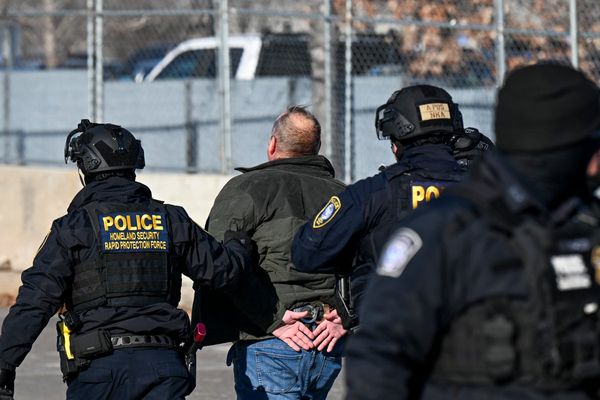ON a rain-dampened Saturday in central London last month, a sea of Palestinian flags flowed towards Downing Street.
Thousands marched bearing placards and chanting familiar demands: an end to the bombing and blockade of Gaza, and what they see as the UK Government’s role in enabling the war.
But further up the road, a smaller knot of protesters planted themselves outside a different government building on Whitehall, home to the Department for Energy Security and Net Zero.
They unfurled a large black banner that read “Defund genocide. Stop Rosebank”. The link between the horrors in the Middle East and an oilfield 80 miles off Shetland’s coast might not have been obvious to passers-by.
For these activists, though – along with a growing list of politicians, environmental groups and pro-Palestine campaigners – it’s a connection that adds an urgent reason to oppose UK oil production: not just because of its climate costs, but because of who stands to profit.
Few outside the UK energy industry have heard of Ithaca Energy. But within the sector, the Aberdeen-based firm is a heavyweight.

To climate campaigners, Ithaca is already controversial due to its stake in Rosebank, one of the North Sea’s last major untapped oil fields.
Rosebank was approved by the previous UK Government in 2023, but a judicial review later challenged the decision. In January, Scotland’s Court of Session ruled the approval unlawful, finding that the climate impact of burning the oil had not been considered.
The Department for Energy Security and Net Zero will play an important role in deciding the field’s future, and the companies behind it say they plan to submit a revised application later this year.
Supporters argue Rosebank could bolster the UK’s energy security, create thousands of jobs and will produce less pollution than oil imported from abroad. Critics say the costs – both environmental and moral – outweigh any benefits.
That’s partly because money from the project could go to Ithaca’s controversial majority owner, Delek Group, one of Israel’s largest companies whose interests in the country span agriculture, real estate and finance.
Through another arm, NewMed Energy, Delek owns the largest stake in Leviathan, another vast and lucrative gas field in the warmer waters off the Israeli coast. Since gas first started flowing from Leviathan in 2019, the Israeli government has reportedly collected nearly £1 billion in royalties and taxes from the field.
Those revenues are set to continue for decades, after the partners in Leviathan signed a £26bn deal to supply gas to Egypt earlier this month.
Campaigners argue revenues from Leviathan help bankroll the same government bombing Gaza.
The UN has made a similar argument. Just weeks before the London march, on June 30, its special rapporteur Francesca Albanese released a report titled From Economy Of Occupation To Economy Of Genocide, examining how companies are involved in what she called Israel’s “settler-colonial project of displacement and replacement of the Palestinians”.
Israel strongly denies committing genocide in Gaza, where more than 60,000 people have been killed by the bombardment that began after Hamas killed 1200 people, mostly Israeli civilians, and took 251 hostages on October 7, 2023.
Albanese’s report, which mentioned Delek and Leviathan, accused firms that provide energy to Israel of supplying infrastructure “used to entrench the permanent annexation and the destruction of Palestinian life” and which “services the Israeli military while it obliterates Gaza”.
“The ostensibly civilian nature of such infrastructure does not exonerate a company from responsibility,” she added.
Delek also has more direct ties to Israel’s military. As The Ferret revealed last year, it owns a stake in a petrol station chain with a contract to supply fuel to IDF vehicles – a deal which was renewed after the bombardment of Gaza began.
The company is no stranger to international scrutiny. As we reported back in 2022, it has been repeatedly named by the UN among companies whose business in the occupied West Bank raise “particular human rights concerns”.
READ MORE: The University of Edinburgh has apologised over its past – but what about Gaza?
It was included on the list for allegedly providing “services and utilities” which support the settlements – considered illegal under international law – and also using natural resources there for “business purposes”.
Noam Perry, a researcher at the American Friends Service Committee – a human rights organisation awarded the Nobel Peace Prize in 1947 for humanitarian work, including helping Jewish refugees escape Nazi Germany – claimed this was evidence Delek is involved in “multiple aspects” of the occupation.
“Speaking in my own capacity as a Jewish Israeli, I would urge everyone to do whatever they can to sever their financial ties with Israeli apartheid and occupation,” Perry added when asked whether Scots should be concerned about Ithaca’s presence in North Sea oil.
Delek’s activities in the disputed Moroccan-occupied territory of Western Sahara – off the coast of which it has explored for oil and gas – have sparked a similar outcry.
The Sahrawi Observatory, which monitors Morocco’s occupation, described Delek’s involvement there as evidence of a “dangerous entanglement between the systems of occupation” in Palestine and Western Sahara.
The Delek empire’s multinational reach is closely tied to its largest shareholder: Yitzhak Tshuva.
A Libyan immigrant to Israel, Tshuva did compulsory service in the IDF and worked for the country’s Ministry of Defense before building a fortune in real estate. By the 2000s, he was a billionaire, the owner of New York’s famed Plaza Hotel, and, according to the Financial Times, a member of Israel’s business oligarchy.
When vast gas reserves, including Leviathan, were located off Israel’s coast at the end of that decade, Tshuva – branded the country’s “gas king” – moved to capitalise. He leveraged political connections in an attempt to protect the profits of energy producers and was quick to assert that the fields lay exclusively under Israeli control.
According to the UN’s trade agency, fields in the resource-rich Levant Basin, such as Leviathan, are in an area that Palestinians may have a historic claim to. If they were allowed to share in their development, billions in potential revenues could flow to support the Palestinian economy.
While it is Delek’s fields in the Middle East that have drawn international attention, in recent years, its North Sea assets have become one of its most reliable income streams.
In Delek’s own corporate filings, the company calls its UK operations, through Ithaca, part of the “growth engine” for the rest of its businesses and Tshuva keeps a close eye on them, sitting on Ithaca’s board of directors.
In some years, the North Sea has been Delek’s largest single source of income. In 2024, it was in line for nearly £200m in dividend payments from Ithaca – and more will follow if Rosebank is approved.
Concern about who profits from North Sea oil are not new.
After Russia’s invasion of Ukraine, the UK arm of state-owned energy giant Gazprom continued producing in British waters, generating £39m in profit in 2023.

The situation with Ithaca and Delek is different: Delek is a private Israeli firm, not a state entity. But campaigners like those on Whitehall believe it deserves similar scrutiny.
The Labour Government has been coy the few times it has been asked about the issue. In a June exchange on Rosebank at Westminster, former shadow chancellor John McDonnell questioned Energy Minister Michael Shanks on whether the Government would “want to be associated” with a company like Ithaca. Shanks (below) said he had to be “careful” about what he said.

Protests and pressure are not just coming from London’s streets or inside Westminster.
In Norway, whose publicly owned energy company Equinor holds the majority stake in Rosebank, campaigners have turned their sights on its partnership with Ithaca.
Equinor was sued by Greenpeace for allegedly failing to conduct proper due diligence on Ithaca and Delek before joining forces on the field. Ironically, the country’s massive oil fund – controlled by the government and funded through revenues from Equinor – sold its shares in Delek in December 2023 due to human rights concerns.
Equinor told The Ferret it had “no influence” on Ithaca’s ownership structure and became a partner on Rosebank with it after Ithaca’s purchase of another firm in 2022. It added that the Rosebank project is “progressing according to plan”.
Perhaps the most vocal mainstream opposition has come from former first minister, Humza Yousaf, who has argued the field should be blocked both for environmental reasons and because of who stands to profit.
“There is little doubt that they [Delek] are an integral part of Israel’s architecture of occupation,” Yousaf (below) told The Ferret. “It is unconscionable that any of their subsidiaries, including Ithaca Energy, can profit from Scotland’s natural resources.”

“Ithaca Energy is a London Stock Exchange-listed company which is a member of the FTSE 250, and which is governed by the highest standards of corporate governance”, a spokesperson said.
“Ithaca is one of the biggest investors in the North Sea and Scotland, is a responsible employer and is a major contributor to both the UK Treasury through tax payments and the UK’s energy security.”
Delek Group did not respond to a request for comment.
Back in London, the protesters outside the energy department eventually packed up and joined the wider march towards Downing Street – after handing out more than 1000 leaflets.
According to Robin Wells, director of Fossil Free London which organised the action, it was not long before many climate activists were protesting again – this time at Parliament Square on August 9, where more than 500 people were arrested for showing support for the proscribed group, Palestine Action.
There’s a growing unity between the climate and Palestinian causes which are increasingly “almost one and the same”, Wells told The Ferret.
The atrocities in Gaza have “captured the hearts of those who campaign on climate because we love people”, Wells continued, adding: “What’s happening there is the horror of our time – and it’s astonishing that the profits from the great injustice of new UK oil and gas could go to a company linked to Israel’s military”.
The North Sea’s reserves have raised questions about ownership for over 50 years – from arguments over privatisation and squandered economic opportunities, to the independence movement’s rallying cry of “Scotland’s oil”.
Whether Rosebank goes ahead or not, as those reserves begin to run dry, protests against Ithaca show the debate has returned once again to who profits, and at what cost.







